Charles Sturt University: Ethical Analysis of China's Social Credit
VerifiedAdded on 2024/07/01
|11
|2513
|500
Essay
AI Summary
This essay provides an ethical analysis of China's Social Credit Score system, applying various ethical theories including utilitarianism, deontology, virtue ethics, and contract theory. It examines the potential benefits and drawbacks of the system, considering its impact on individual happiness, moral duties, character development, and social contracts. The essay discusses how each theory views the implementation of the social credit system, highlighting the ethical considerations and potential conflicts that arise. It concludes by summarizing the diverse perspectives offered by these ethical frameworks and their implications for the design and governance of the social credit system in China. The document is available on Desklib, a platform offering a wide range of study resources for students.
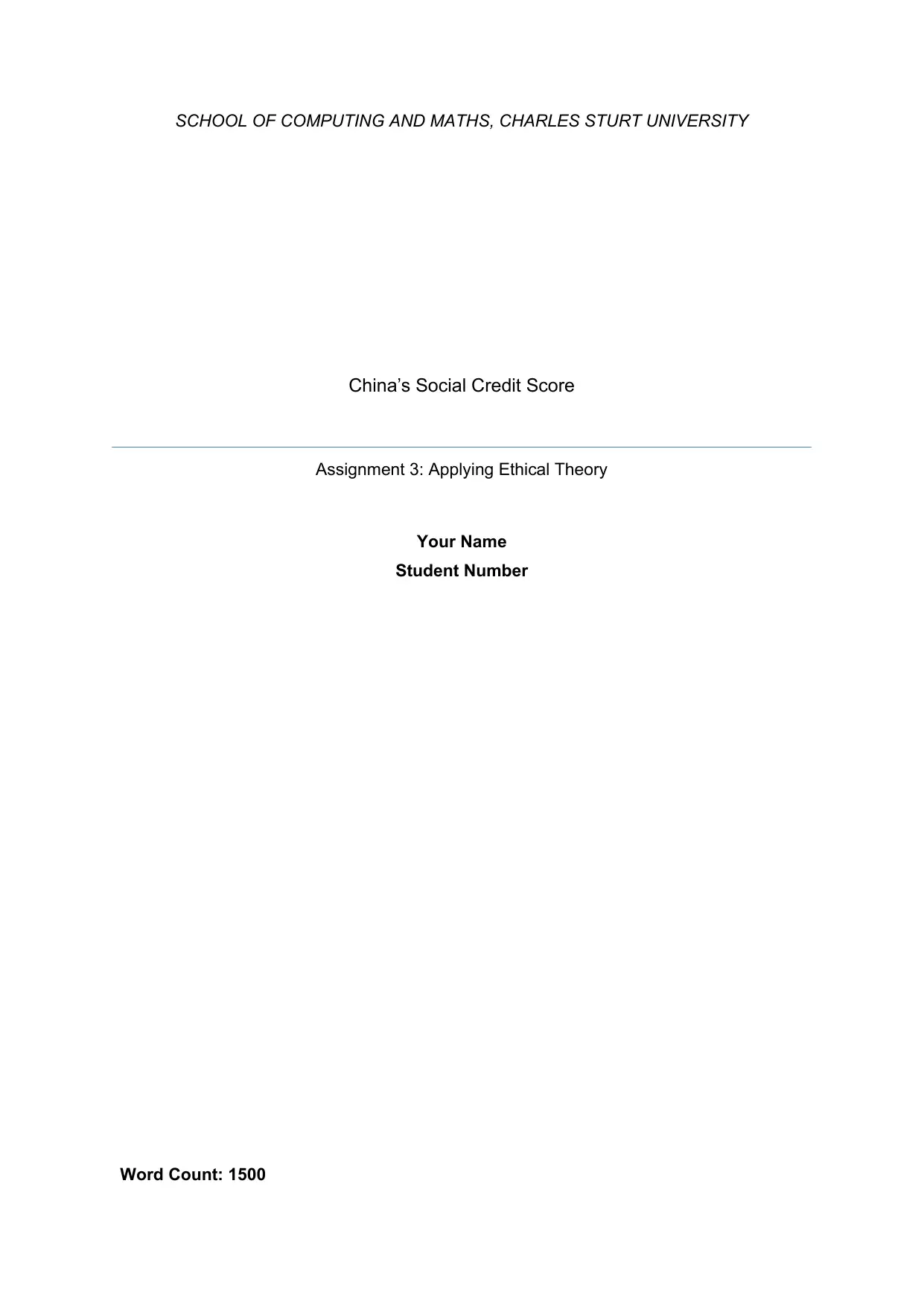
SCHOOL OF COMPUTING AND MATHS, CHARLES STURT UNIVERSITY
China’s Social Credit Score
Assignment 3: Applying Ethical Theory
Your Name
Student Number
Word Count: 1500
China’s Social Credit Score
Assignment 3: Applying Ethical Theory
Your Name
Student Number
Word Count: 1500
Paraphrase This Document
Need a fresh take? Get an instant paraphrase of this document with our AI Paraphraser
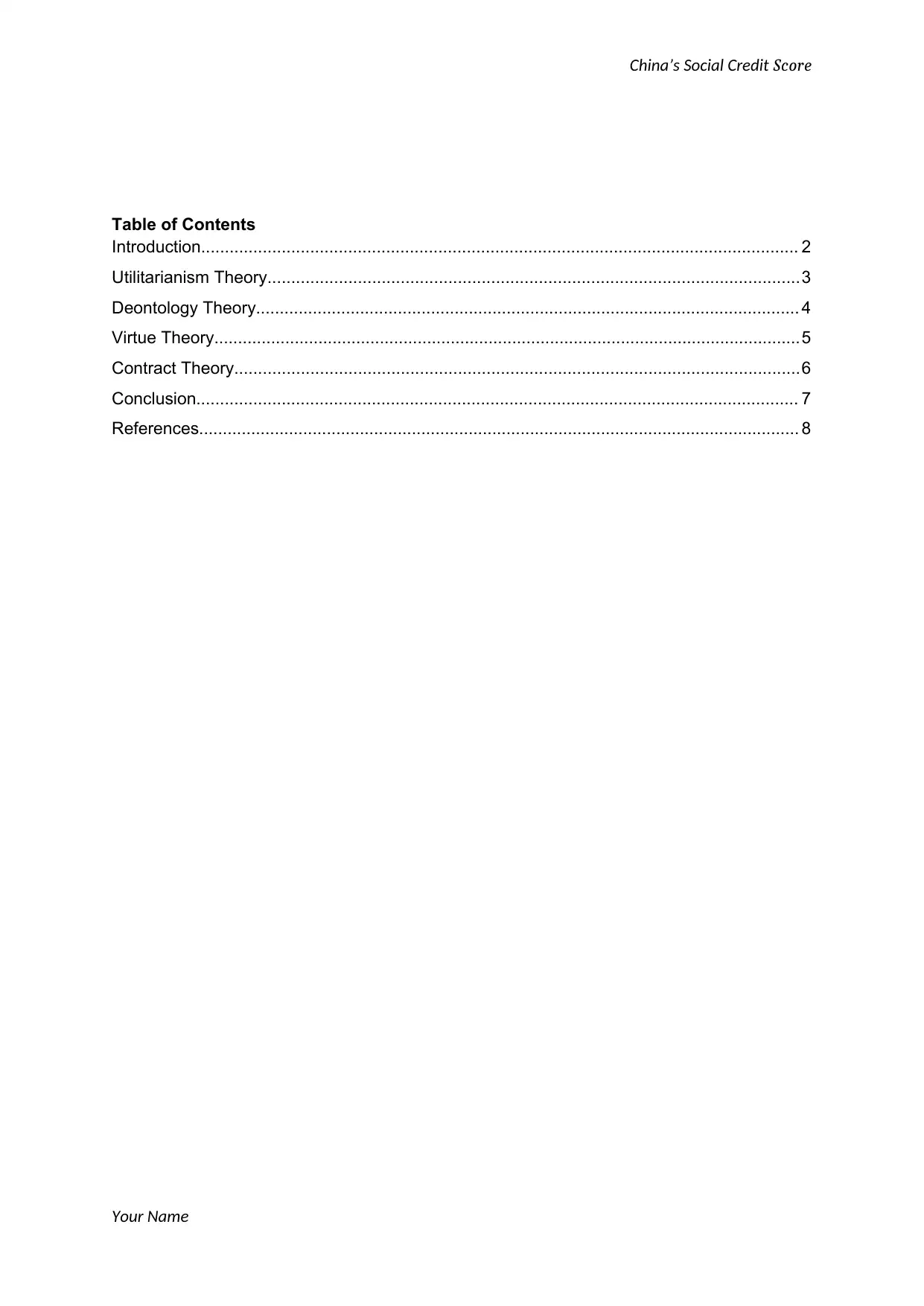
China’s Social Credit Score
Table of Contents
Introduction.............................................................................................................................. 2
Utilitarianism Theory................................................................................................................3
Deontology Theory................................................................................................................... 4
Virtue Theory............................................................................................................................5
Contract Theory.......................................................................................................................6
Conclusion............................................................................................................................... 7
References............................................................................................................................... 8
Your Name
Table of Contents
Introduction.............................................................................................................................. 2
Utilitarianism Theory................................................................................................................3
Deontology Theory................................................................................................................... 4
Virtue Theory............................................................................................................................5
Contract Theory.......................................................................................................................6
Conclusion............................................................................................................................... 7
References............................................................................................................................... 8
Your Name
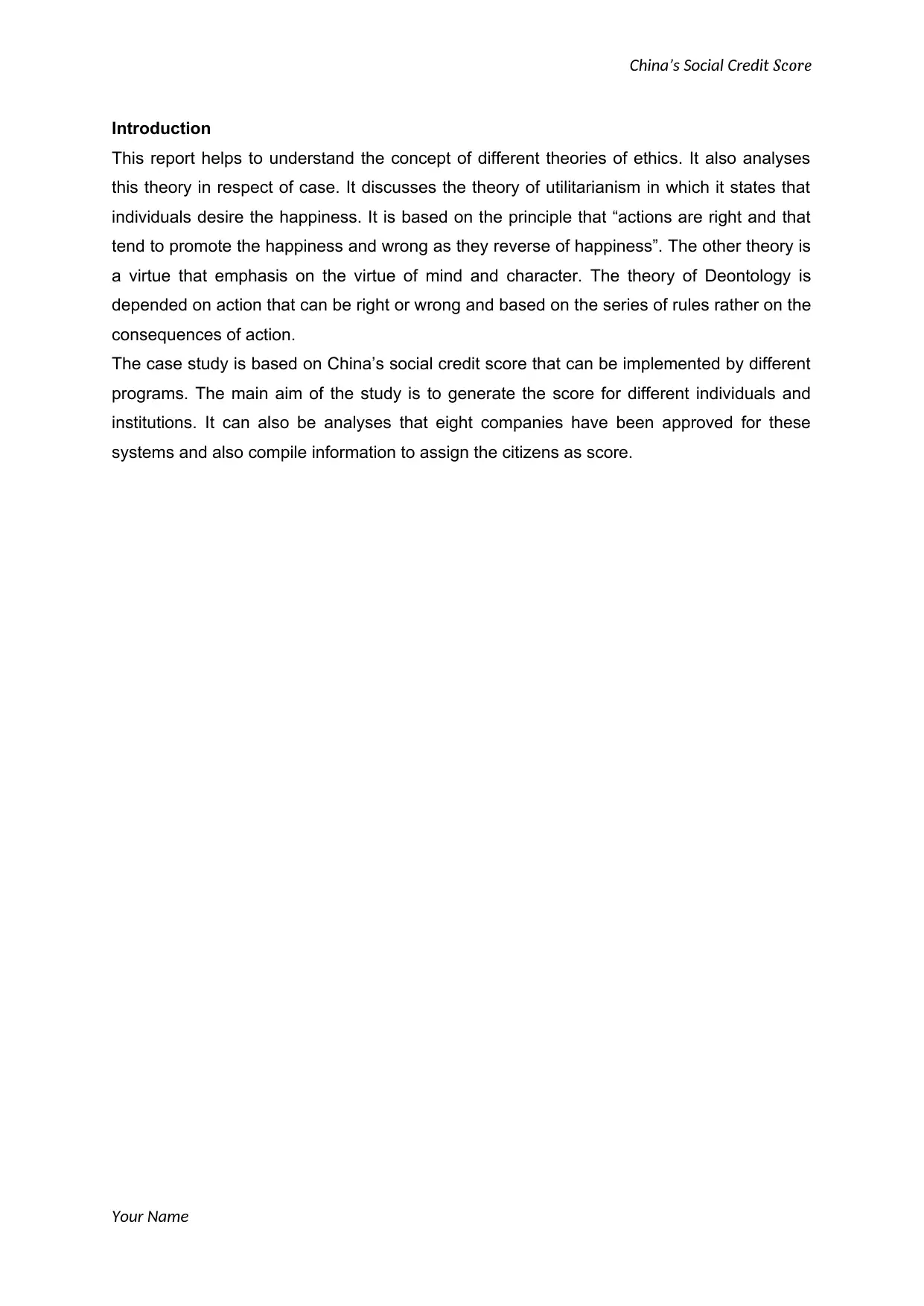
China’s Social Credit Score
Introduction
This report helps to understand the concept of different theories of ethics. It also analyses
this theory in respect of case. It discusses the theory of utilitarianism in which it states that
individuals desire the happiness. It is based on the principle that “actions are right and that
tend to promote the happiness and wrong as they reverse of happiness”. The other theory is
a virtue that emphasis on the virtue of mind and character. The theory of Deontology is
depended on action that can be right or wrong and based on the series of rules rather on the
consequences of action.
The case study is based on China’s social credit score that can be implemented by different
programs. The main aim of the study is to generate the score for different individuals and
institutions. It can also be analyses that eight companies have been approved for these
systems and also compile information to assign the citizens as score.
Your Name
Introduction
This report helps to understand the concept of different theories of ethics. It also analyses
this theory in respect of case. It discusses the theory of utilitarianism in which it states that
individuals desire the happiness. It is based on the principle that “actions are right and that
tend to promote the happiness and wrong as they reverse of happiness”. The other theory is
a virtue that emphasis on the virtue of mind and character. The theory of Deontology is
depended on action that can be right or wrong and based on the series of rules rather on the
consequences of action.
The case study is based on China’s social credit score that can be implemented by different
programs. The main aim of the study is to generate the score for different individuals and
institutions. It can also be analyses that eight companies have been approved for these
systems and also compile information to assign the citizens as score.
Your Name
⊘ This is a preview!⊘
Do you want full access?
Subscribe today to unlock all pages.

Trusted by 1+ million students worldwide
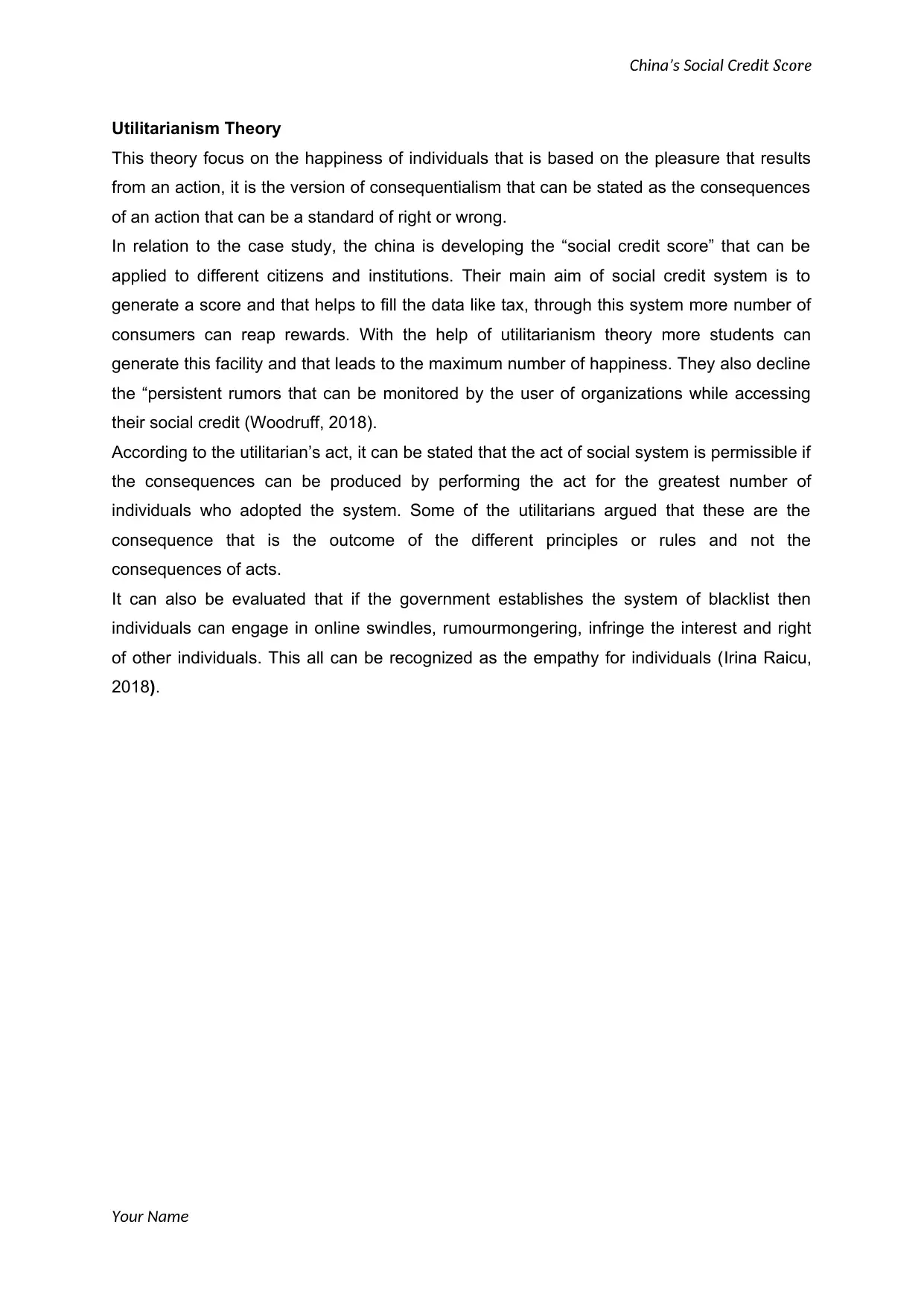
China’s Social Credit Score
Utilitarianism Theory
This theory focus on the happiness of individuals that is based on the pleasure that results
from an action, it is the version of consequentialism that can be stated as the consequences
of an action that can be a standard of right or wrong.
In relation to the case study, the china is developing the “social credit score” that can be
applied to different citizens and institutions. Their main aim of social credit system is to
generate a score and that helps to fill the data like tax, through this system more number of
consumers can reap rewards. With the help of utilitarianism theory more students can
generate this facility and that leads to the maximum number of happiness. They also decline
the “persistent rumors that can be monitored by the user of organizations while accessing
their social credit (Woodruff, 2018).
According to the utilitarian’s act, it can be stated that the act of social system is permissible if
the consequences can be produced by performing the act for the greatest number of
individuals who adopted the system. Some of the utilitarians argued that these are the
consequence that is the outcome of the different principles or rules and not the
consequences of acts.
It can also be evaluated that if the government establishes the system of blacklist then
individuals can engage in online swindles, rumourmongering, infringe the interest and right
of other individuals. This all can be recognized as the empathy for individuals (Irina Raicu,
2018).
Your Name
Utilitarianism Theory
This theory focus on the happiness of individuals that is based on the pleasure that results
from an action, it is the version of consequentialism that can be stated as the consequences
of an action that can be a standard of right or wrong.
In relation to the case study, the china is developing the “social credit score” that can be
applied to different citizens and institutions. Their main aim of social credit system is to
generate a score and that helps to fill the data like tax, through this system more number of
consumers can reap rewards. With the help of utilitarianism theory more students can
generate this facility and that leads to the maximum number of happiness. They also decline
the “persistent rumors that can be monitored by the user of organizations while accessing
their social credit (Woodruff, 2018).
According to the utilitarian’s act, it can be stated that the act of social system is permissible if
the consequences can be produced by performing the act for the greatest number of
individuals who adopted the system. Some of the utilitarians argued that these are the
consequence that is the outcome of the different principles or rules and not the
consequences of acts.
It can also be evaluated that if the government establishes the system of blacklist then
individuals can engage in online swindles, rumourmongering, infringe the interest and right
of other individuals. This all can be recognized as the empathy for individuals (Irina Raicu,
2018).
Your Name
Paraphrase This Document
Need a fresh take? Get an instant paraphrase of this document with our AI Paraphraser
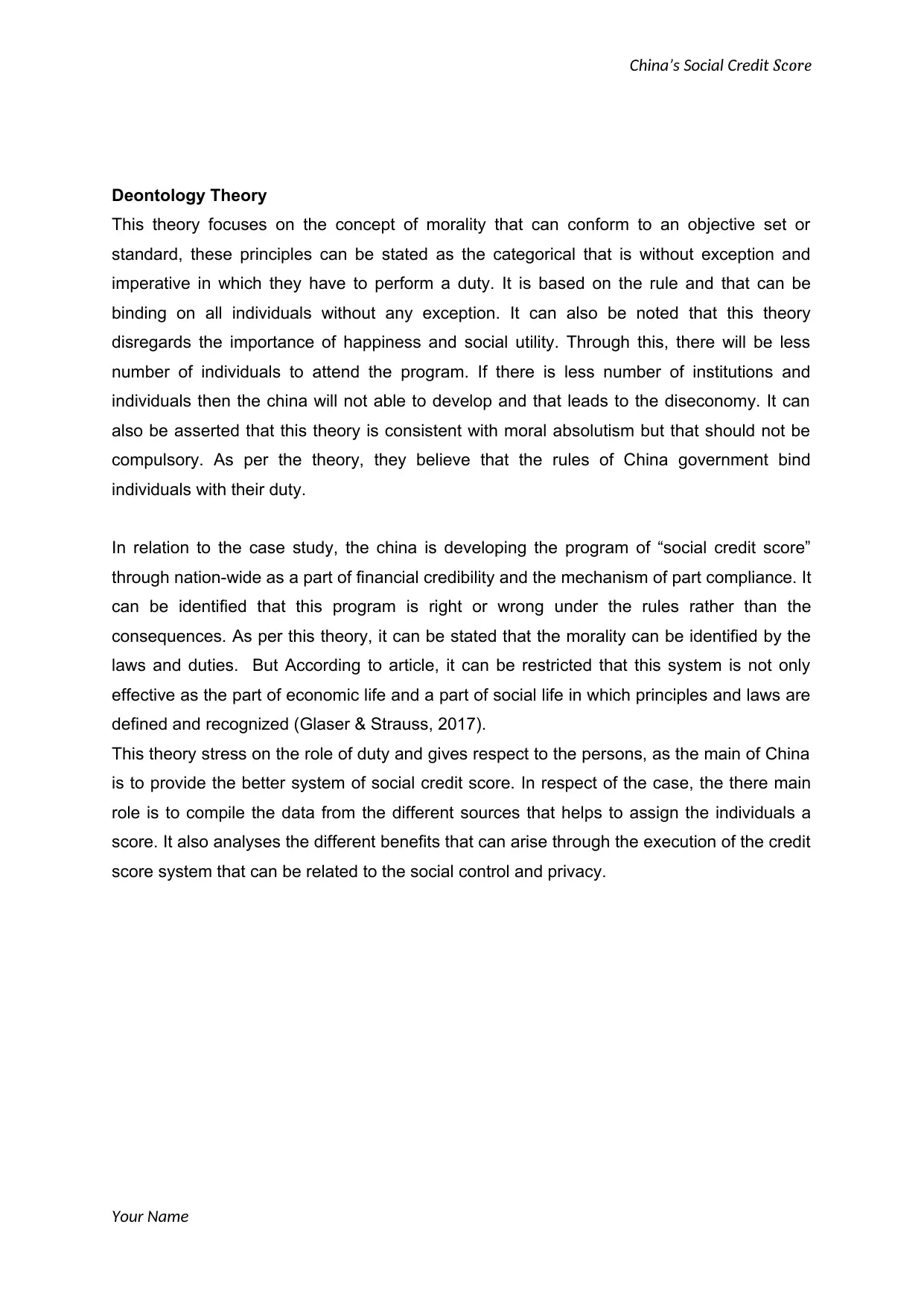
China’s Social Credit Score
Deontology Theory
This theory focuses on the concept of morality that can conform to an objective set or
standard, these principles can be stated as the categorical that is without exception and
imperative in which they have to perform a duty. It is based on the rule and that can be
binding on all individuals without any exception. It can also be noted that this theory
disregards the importance of happiness and social utility. Through this, there will be less
number of individuals to attend the program. If there is less number of institutions and
individuals then the china will not able to develop and that leads to the diseconomy. It can
also be asserted that this theory is consistent with moral absolutism but that should not be
compulsory. As per the theory, they believe that the rules of China government bind
individuals with their duty.
In relation to the case study, the china is developing the program of “social credit score”
through nation-wide as a part of financial credibility and the mechanism of part compliance. It
can be identified that this program is right or wrong under the rules rather than the
consequences. As per this theory, it can be stated that the morality can be identified by the
laws and duties. But According to article, it can be restricted that this system is not only
effective as the part of economic life and a part of social life in which principles and laws are
defined and recognized (Glaser & Strauss, 2017).
This theory stress on the role of duty and gives respect to the persons, as the main of China
is to provide the better system of social credit score. In respect of the case, the there main
role is to compile the data from the different sources that helps to assign the individuals a
score. It also analyses the different benefits that can arise through the execution of the credit
score system that can be related to the social control and privacy.
Your Name
Deontology Theory
This theory focuses on the concept of morality that can conform to an objective set or
standard, these principles can be stated as the categorical that is without exception and
imperative in which they have to perform a duty. It is based on the rule and that can be
binding on all individuals without any exception. It can also be noted that this theory
disregards the importance of happiness and social utility. Through this, there will be less
number of individuals to attend the program. If there is less number of institutions and
individuals then the china will not able to develop and that leads to the diseconomy. It can
also be asserted that this theory is consistent with moral absolutism but that should not be
compulsory. As per the theory, they believe that the rules of China government bind
individuals with their duty.
In relation to the case study, the china is developing the program of “social credit score”
through nation-wide as a part of financial credibility and the mechanism of part compliance. It
can be identified that this program is right or wrong under the rules rather than the
consequences. As per this theory, it can be stated that the morality can be identified by the
laws and duties. But According to article, it can be restricted that this system is not only
effective as the part of economic life and a part of social life in which principles and laws are
defined and recognized (Glaser & Strauss, 2017).
This theory stress on the role of duty and gives respect to the persons, as the main of China
is to provide the better system of social credit score. In respect of the case, the there main
role is to compile the data from the different sources that helps to assign the individuals a
score. It also analyses the different benefits that can arise through the execution of the credit
score system that can be related to the social control and privacy.
Your Name
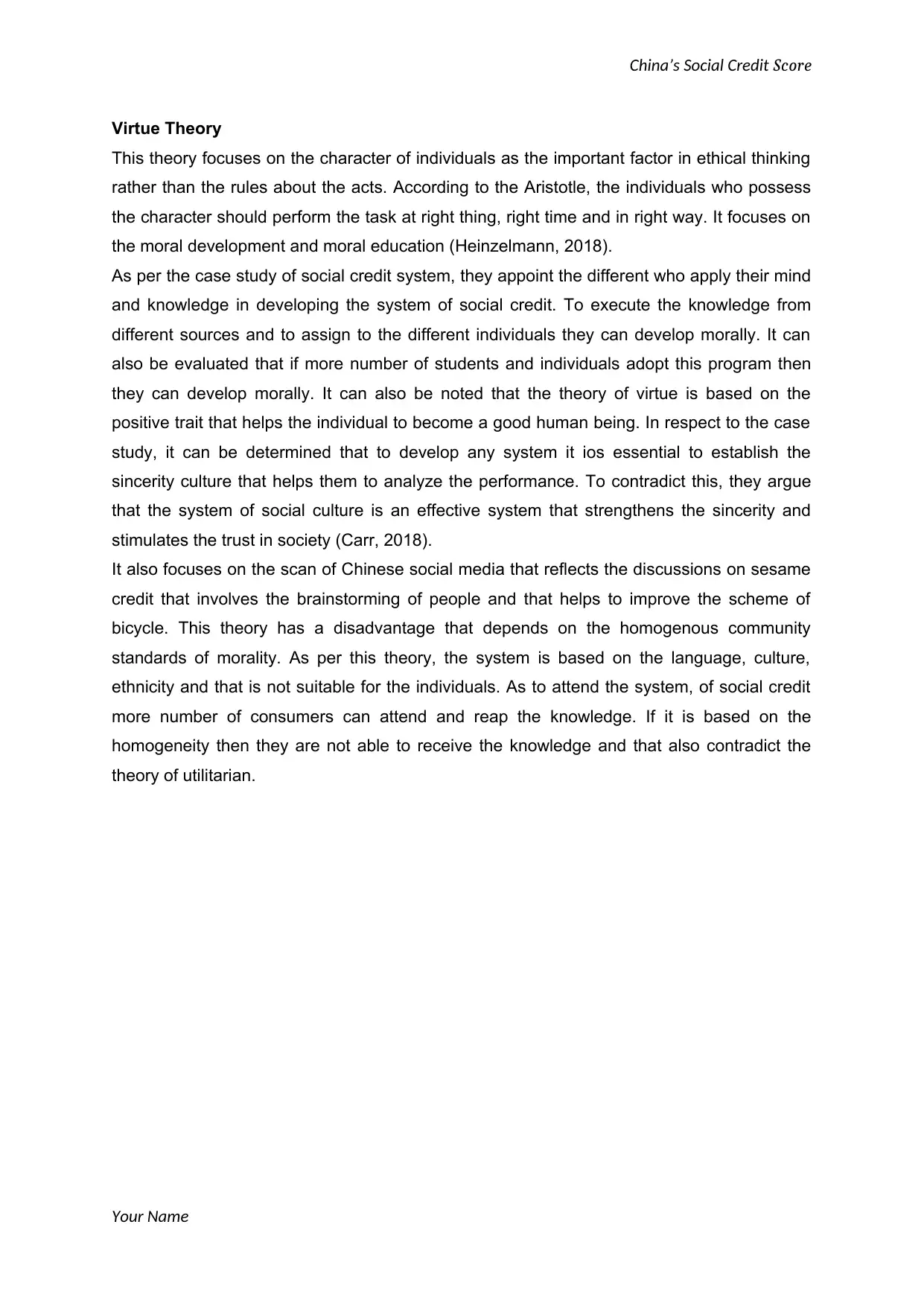
China’s Social Credit Score
Virtue Theory
This theory focuses on the character of individuals as the important factor in ethical thinking
rather than the rules about the acts. According to the Aristotle, the individuals who possess
the character should perform the task at right thing, right time and in right way. It focuses on
the moral development and moral education (Heinzelmann, 2018).
As per the case study of social credit system, they appoint the different who apply their mind
and knowledge in developing the system of social credit. To execute the knowledge from
different sources and to assign to the different individuals they can develop morally. It can
also be evaluated that if more number of students and individuals adopt this program then
they can develop morally. It can also be noted that the theory of virtue is based on the
positive trait that helps the individual to become a good human being. In respect to the case
study, it can be determined that to develop any system it ios essential to establish the
sincerity culture that helps them to analyze the performance. To contradict this, they argue
that the system of social culture is an effective system that strengthens the sincerity and
stimulates the trust in society (Carr, 2018).
It also focuses on the scan of Chinese social media that reflects the discussions on sesame
credit that involves the brainstorming of people and that helps to improve the scheme of
bicycle. This theory has a disadvantage that depends on the homogenous community
standards of morality. As per this theory, the system is based on the language, culture,
ethnicity and that is not suitable for the individuals. As to attend the system, of social credit
more number of consumers can attend and reap the knowledge. If it is based on the
homogeneity then they are not able to receive the knowledge and that also contradict the
theory of utilitarian.
Your Name
Virtue Theory
This theory focuses on the character of individuals as the important factor in ethical thinking
rather than the rules about the acts. According to the Aristotle, the individuals who possess
the character should perform the task at right thing, right time and in right way. It focuses on
the moral development and moral education (Heinzelmann, 2018).
As per the case study of social credit system, they appoint the different who apply their mind
and knowledge in developing the system of social credit. To execute the knowledge from
different sources and to assign to the different individuals they can develop morally. It can
also be evaluated that if more number of students and individuals adopt this program then
they can develop morally. It can also be noted that the theory of virtue is based on the
positive trait that helps the individual to become a good human being. In respect to the case
study, it can be determined that to develop any system it ios essential to establish the
sincerity culture that helps them to analyze the performance. To contradict this, they argue
that the system of social culture is an effective system that strengthens the sincerity and
stimulates the trust in society (Carr, 2018).
It also focuses on the scan of Chinese social media that reflects the discussions on sesame
credit that involves the brainstorming of people and that helps to improve the scheme of
bicycle. This theory has a disadvantage that depends on the homogenous community
standards of morality. As per this theory, the system is based on the language, culture,
ethnicity and that is not suitable for the individuals. As to attend the system, of social credit
more number of consumers can attend and reap the knowledge. If it is based on the
homogeneity then they are not able to receive the knowledge and that also contradict the
theory of utilitarian.
Your Name
⊘ This is a preview!⊘
Do you want full access?
Subscribe today to unlock all pages.

Trusted by 1+ million students worldwide
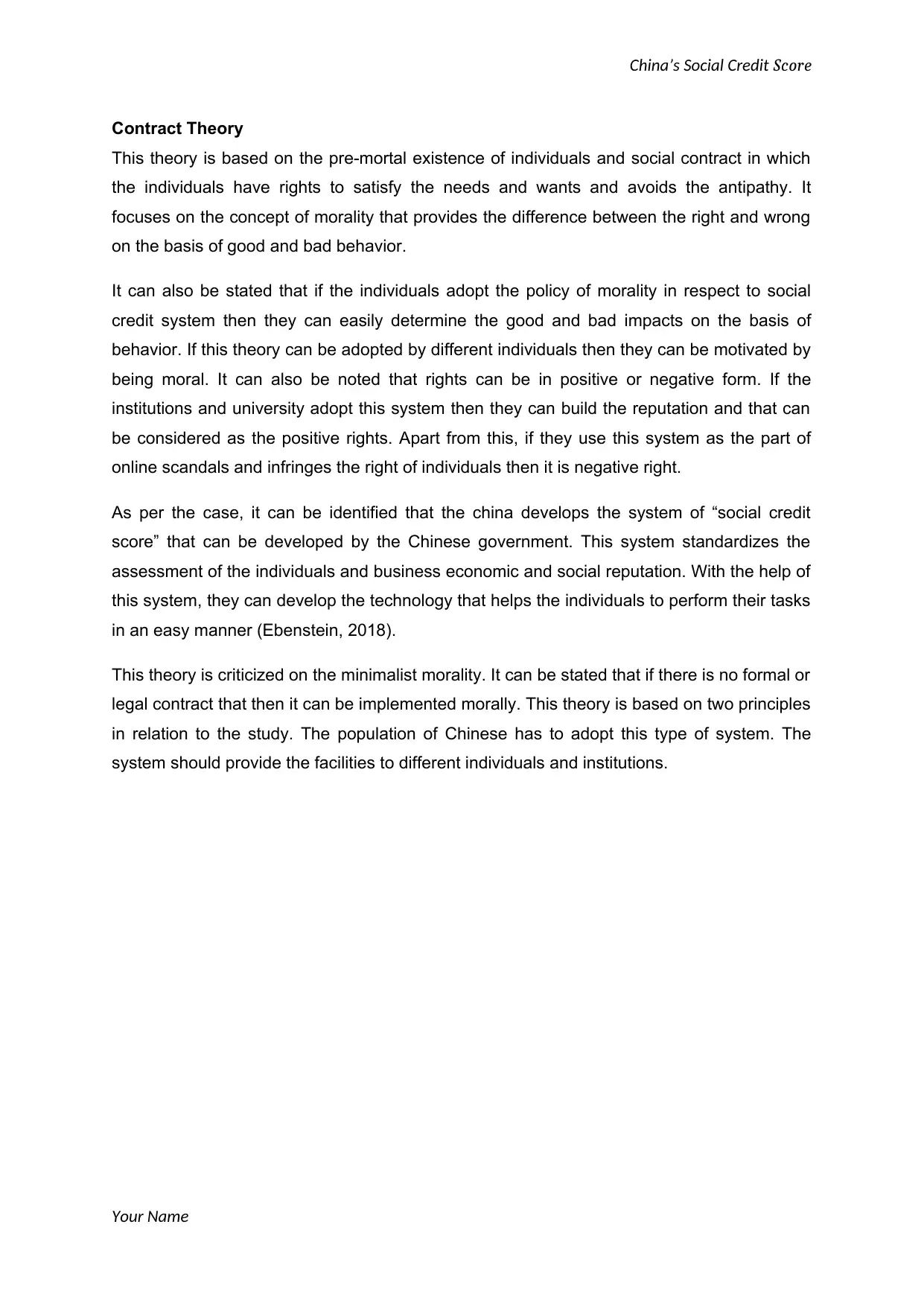
China’s Social Credit Score
Contract Theory
This theory is based on the pre-mortal existence of individuals and social contract in which
the individuals have rights to satisfy the needs and wants and avoids the antipathy. It
focuses on the concept of morality that provides the difference between the right and wrong
on the basis of good and bad behavior.
It can also be stated that if the individuals adopt the policy of morality in respect to social
credit system then they can easily determine the good and bad impacts on the basis of
behavior. If this theory can be adopted by different individuals then they can be motivated by
being moral. It can also be noted that rights can be in positive or negative form. If the
institutions and university adopt this system then they can build the reputation and that can
be considered as the positive rights. Apart from this, if they use this system as the part of
online scandals and infringes the right of individuals then it is negative right.
As per the case, it can be identified that the china develops the system of “social credit
score” that can be developed by the Chinese government. This system standardizes the
assessment of the individuals and business economic and social reputation. With the help of
this system, they can develop the technology that helps the individuals to perform their tasks
in an easy manner (Ebenstein, 2018).
This theory is criticized on the minimalist morality. It can be stated that if there is no formal or
legal contract that then it can be implemented morally. This theory is based on two principles
in relation to the study. The population of Chinese has to adopt this type of system. The
system should provide the facilities to different individuals and institutions.
Your Name
Contract Theory
This theory is based on the pre-mortal existence of individuals and social contract in which
the individuals have rights to satisfy the needs and wants and avoids the antipathy. It
focuses on the concept of morality that provides the difference between the right and wrong
on the basis of good and bad behavior.
It can also be stated that if the individuals adopt the policy of morality in respect to social
credit system then they can easily determine the good and bad impacts on the basis of
behavior. If this theory can be adopted by different individuals then they can be motivated by
being moral. It can also be noted that rights can be in positive or negative form. If the
institutions and university adopt this system then they can build the reputation and that can
be considered as the positive rights. Apart from this, if they use this system as the part of
online scandals and infringes the right of individuals then it is negative right.
As per the case, it can be identified that the china develops the system of “social credit
score” that can be developed by the Chinese government. This system standardizes the
assessment of the individuals and business economic and social reputation. With the help of
this system, they can develop the technology that helps the individuals to perform their tasks
in an easy manner (Ebenstein, 2018).
This theory is criticized on the minimalist morality. It can be stated that if there is no formal or
legal contract that then it can be implemented morally. This theory is based on two principles
in relation to the study. The population of Chinese has to adopt this type of system. The
system should provide the facilities to different individuals and institutions.
Your Name
Paraphrase This Document
Need a fresh take? Get an instant paraphrase of this document with our AI Paraphraser
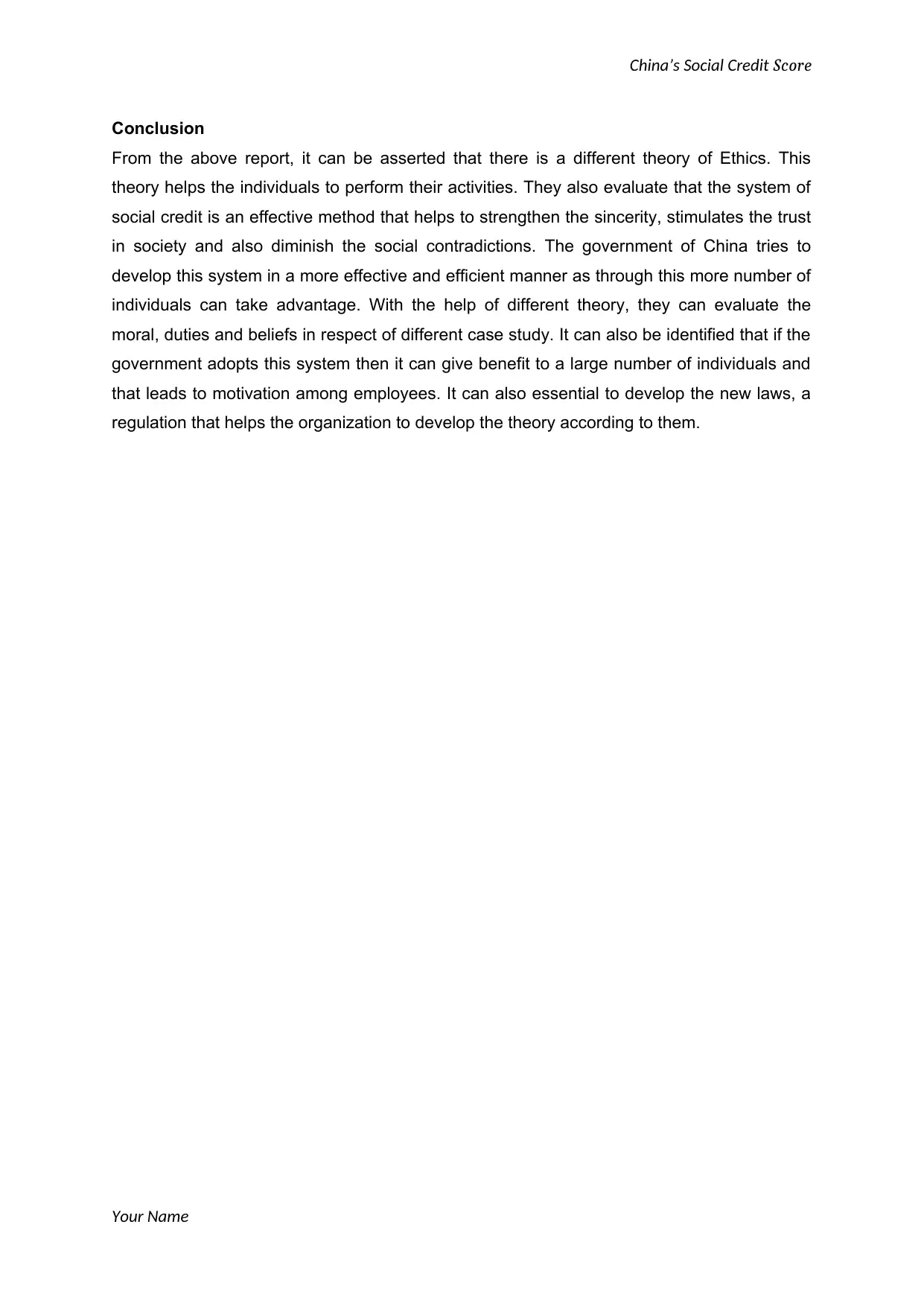
China’s Social Credit Score
Conclusion
From the above report, it can be asserted that there is a different theory of Ethics. This
theory helps the individuals to perform their activities. They also evaluate that the system of
social credit is an effective method that helps to strengthen the sincerity, stimulates the trust
in society and also diminish the social contradictions. The government of China tries to
develop this system in a more effective and efficient manner as through this more number of
individuals can take advantage. With the help of different theory, they can evaluate the
moral, duties and beliefs in respect of different case study. It can also be identified that if the
government adopts this system then it can give benefit to a large number of individuals and
that leads to motivation among employees. It can also essential to develop the new laws, a
regulation that helps the organization to develop the theory according to them.
Your Name
Conclusion
From the above report, it can be asserted that there is a different theory of Ethics. This
theory helps the individuals to perform their activities. They also evaluate that the system of
social credit is an effective method that helps to strengthen the sincerity, stimulates the trust
in society and also diminish the social contradictions. The government of China tries to
develop this system in a more effective and efficient manner as through this more number of
individuals can take advantage. With the help of different theory, they can evaluate the
moral, duties and beliefs in respect of different case study. It can also be identified that if the
government adopts this system then it can give benefit to a large number of individuals and
that leads to motivation among employees. It can also essential to develop the new laws, a
regulation that helps the organization to develop the theory according to them.
Your Name
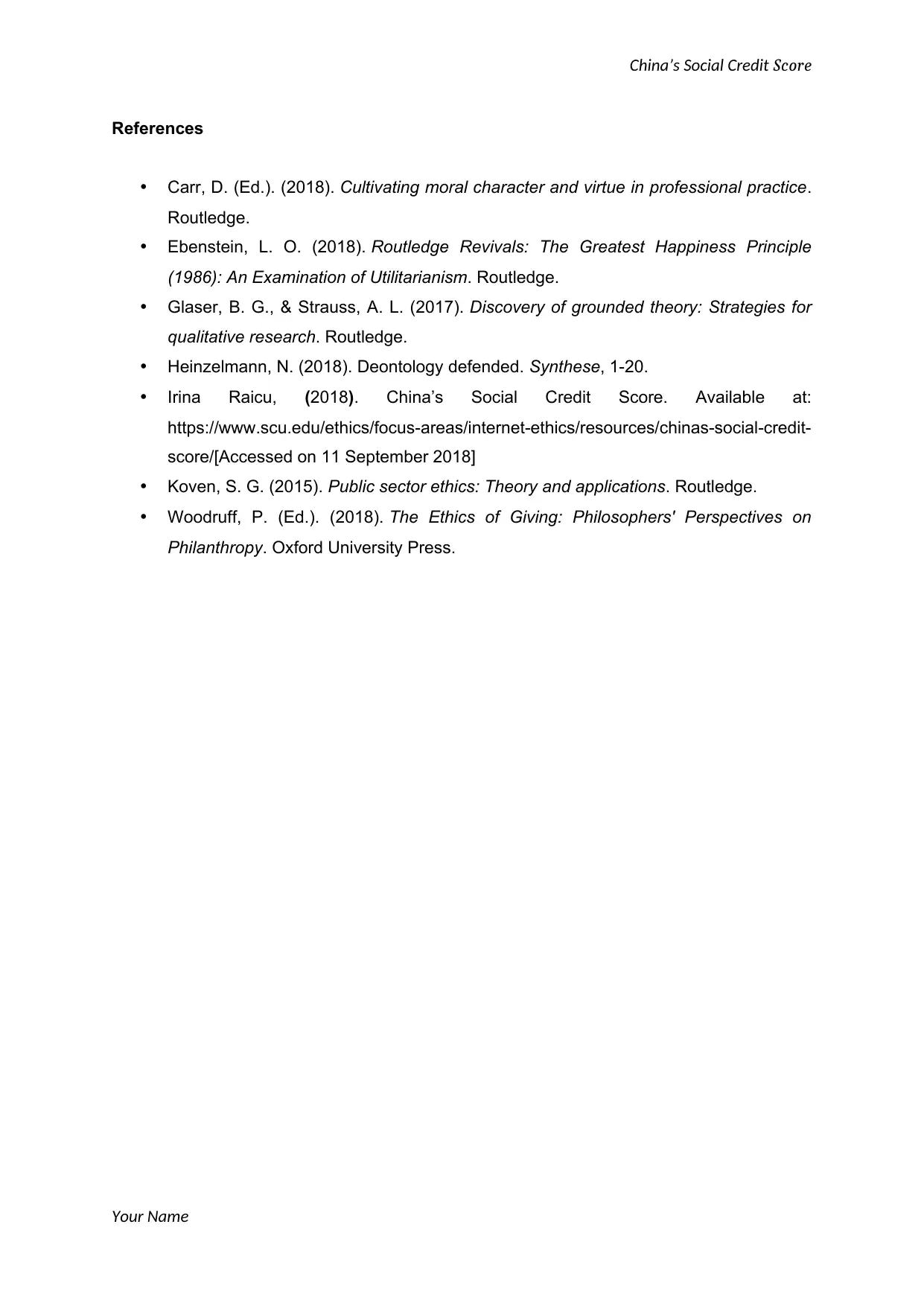
China’s Social Credit Score
References
Carr, D. (Ed.). (2018). Cultivating moral character and virtue in professional practice.
Routledge.
Ebenstein, L. O. (2018). Routledge Revivals: The Greatest Happiness Principle
(1986): An Examination of Utilitarianism. Routledge.
Glaser, B. G., & Strauss, A. L. (2017). Discovery of grounded theory: Strategies for
qualitative research. Routledge.
Heinzelmann, N. (2018). Deontology defended. Synthese, 1-20.
Irina Raicu, (2018). China’s Social Credit Score. Available at:
https://www.scu.edu/ethics/focus-areas/internet-ethics/resources/chinas-social-credit-
score/[Accessed on 11 September 2018]
Koven, S. G. (2015). Public sector ethics: Theory and applications. Routledge.
Woodruff, P. (Ed.). (2018). The Ethics of Giving: Philosophers' Perspectives on
Philanthropy. Oxford University Press.
Your Name
References
Carr, D. (Ed.). (2018). Cultivating moral character and virtue in professional practice.
Routledge.
Ebenstein, L. O. (2018). Routledge Revivals: The Greatest Happiness Principle
(1986): An Examination of Utilitarianism. Routledge.
Glaser, B. G., & Strauss, A. L. (2017). Discovery of grounded theory: Strategies for
qualitative research. Routledge.
Heinzelmann, N. (2018). Deontology defended. Synthese, 1-20.
Irina Raicu, (2018). China’s Social Credit Score. Available at:
https://www.scu.edu/ethics/focus-areas/internet-ethics/resources/chinas-social-credit-
score/[Accessed on 11 September 2018]
Koven, S. G. (2015). Public sector ethics: Theory and applications. Routledge.
Woodruff, P. (Ed.). (2018). The Ethics of Giving: Philosophers' Perspectives on
Philanthropy. Oxford University Press.
Your Name
⊘ This is a preview!⊘
Do you want full access?
Subscribe today to unlock all pages.

Trusted by 1+ million students worldwide
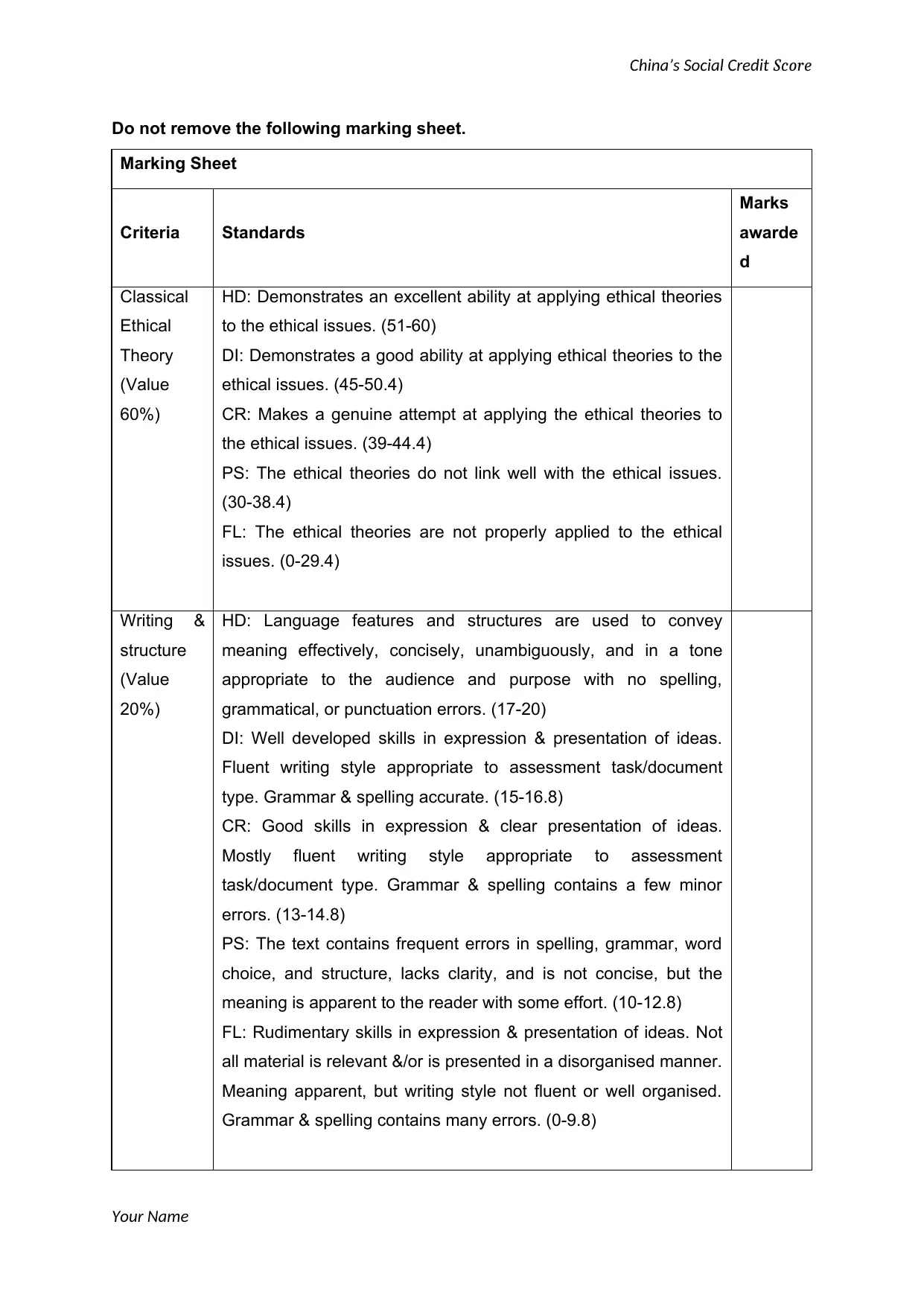
China’s Social Credit Score
Do not remove the following marking sheet.
Marking Sheet
Criteria Standards
Marks
awarde
d
Classical
Ethical
Theory
(Value
60%)
HD: Demonstrates an excellent ability at applying ethical theories
to the ethical issues. (51-60)
DI: Demonstrates a good ability at applying ethical theories to the
ethical issues. (45-50.4)
CR: Makes a genuine attempt at applying the ethical theories to
the ethical issues. (39-44.4)
PS: The ethical theories do not link well with the ethical issues.
(30-38.4)
FL: The ethical theories are not properly applied to the ethical
issues. (0-29.4)
Writing &
structure
(Value
20%)
HD: Language features and structures are used to convey
meaning effectively, concisely, unambiguously, and in a tone
appropriate to the audience and purpose with no spelling,
grammatical, or punctuation errors. (17-20)
DI: Well developed skills in expression & presentation of ideas.
Fluent writing style appropriate to assessment task/document
type. Grammar & spelling accurate. (15-16.8)
CR: Good skills in expression & clear presentation of ideas.
Mostly fluent writing style appropriate to assessment
task/document type. Grammar & spelling contains a few minor
errors. (13-14.8)
PS: The text contains frequent errors in spelling, grammar, word
choice, and structure, lacks clarity, and is not concise, but the
meaning is apparent to the reader with some effort. (10-12.8)
FL: Rudimentary skills in expression & presentation of ideas. Not
all material is relevant &/or is presented in a disorganised manner.
Meaning apparent, but writing style not fluent or well organised.
Grammar & spelling contains many errors. (0-9.8)
Your Name
Do not remove the following marking sheet.
Marking Sheet
Criteria Standards
Marks
awarde
d
Classical
Ethical
Theory
(Value
60%)
HD: Demonstrates an excellent ability at applying ethical theories
to the ethical issues. (51-60)
DI: Demonstrates a good ability at applying ethical theories to the
ethical issues. (45-50.4)
CR: Makes a genuine attempt at applying the ethical theories to
the ethical issues. (39-44.4)
PS: The ethical theories do not link well with the ethical issues.
(30-38.4)
FL: The ethical theories are not properly applied to the ethical
issues. (0-29.4)
Writing &
structure
(Value
20%)
HD: Language features and structures are used to convey
meaning effectively, concisely, unambiguously, and in a tone
appropriate to the audience and purpose with no spelling,
grammatical, or punctuation errors. (17-20)
DI: Well developed skills in expression & presentation of ideas.
Fluent writing style appropriate to assessment task/document
type. Grammar & spelling accurate. (15-16.8)
CR: Good skills in expression & clear presentation of ideas.
Mostly fluent writing style appropriate to assessment
task/document type. Grammar & spelling contains a few minor
errors. (13-14.8)
PS: The text contains frequent errors in spelling, grammar, word
choice, and structure, lacks clarity, and is not concise, but the
meaning is apparent to the reader with some effort. (10-12.8)
FL: Rudimentary skills in expression & presentation of ideas. Not
all material is relevant &/or is presented in a disorganised manner.
Meaning apparent, but writing style not fluent or well organised.
Grammar & spelling contains many errors. (0-9.8)
Your Name
Paraphrase This Document
Need a fresh take? Get an instant paraphrase of this document with our AI Paraphraser
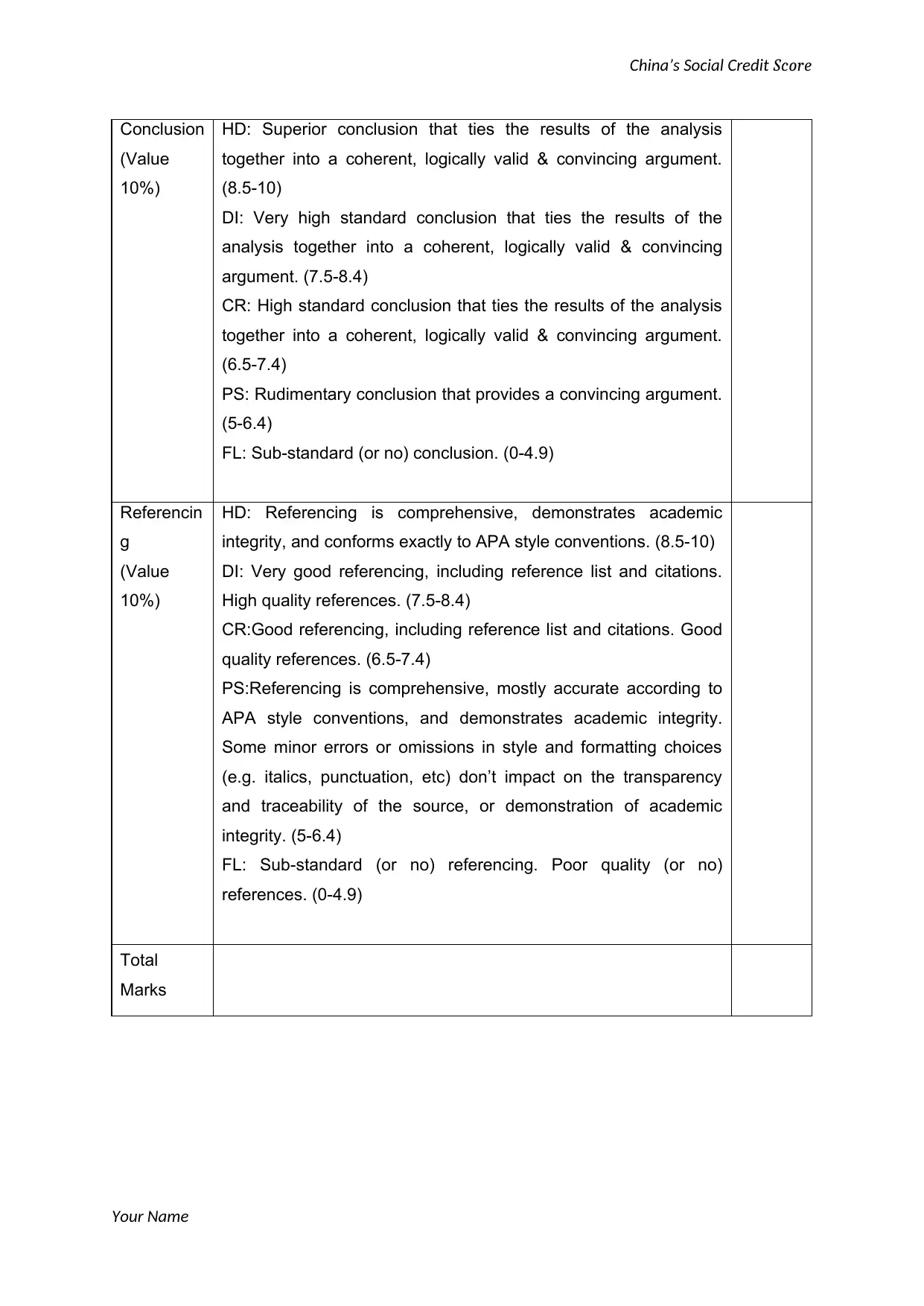
China’s Social Credit Score
Conclusion
(Value
10%)
HD: Superior conclusion that ties the results of the analysis
together into a coherent, logically valid & convincing argument.
(8.5-10)
DI: Very high standard conclusion that ties the results of the
analysis together into a coherent, logically valid & convincing
argument. (7.5-8.4)
CR: High standard conclusion that ties the results of the analysis
together into a coherent, logically valid & convincing argument.
(6.5-7.4)
PS: Rudimentary conclusion that provides a convincing argument.
(5-6.4)
FL: Sub-standard (or no) conclusion. (0-4.9)
Referencin
g
(Value
10%)
HD: Referencing is comprehensive, demonstrates academic
integrity, and conforms exactly to APA style conventions. (8.5-10)
DI: Very good referencing, including reference list and citations.
High quality references. (7.5-8.4)
CR:Good referencing, including reference list and citations. Good
quality references. (6.5-7.4)
PS:Referencing is comprehensive, mostly accurate according to
APA style conventions, and demonstrates academic integrity.
Some minor errors or omissions in style and formatting choices
(e.g. italics, punctuation, etc) don’t impact on the transparency
and traceability of the source, or demonstration of academic
integrity. (5-6.4)
FL: Sub-standard (or no) referencing. Poor quality (or no)
references. (0-4.9)
Total
Marks
Your Name
Conclusion
(Value
10%)
HD: Superior conclusion that ties the results of the analysis
together into a coherent, logically valid & convincing argument.
(8.5-10)
DI: Very high standard conclusion that ties the results of the
analysis together into a coherent, logically valid & convincing
argument. (7.5-8.4)
CR: High standard conclusion that ties the results of the analysis
together into a coherent, logically valid & convincing argument.
(6.5-7.4)
PS: Rudimentary conclusion that provides a convincing argument.
(5-6.4)
FL: Sub-standard (or no) conclusion. (0-4.9)
Referencin
g
(Value
10%)
HD: Referencing is comprehensive, demonstrates academic
integrity, and conforms exactly to APA style conventions. (8.5-10)
DI: Very good referencing, including reference list and citations.
High quality references. (7.5-8.4)
CR:Good referencing, including reference list and citations. Good
quality references. (6.5-7.4)
PS:Referencing is comprehensive, mostly accurate according to
APA style conventions, and demonstrates academic integrity.
Some minor errors or omissions in style and formatting choices
(e.g. italics, punctuation, etc) don’t impact on the transparency
and traceability of the source, or demonstration of academic
integrity. (5-6.4)
FL: Sub-standard (or no) referencing. Poor quality (or no)
references. (0-4.9)
Total
Marks
Your Name
1 out of 11
Related Documents
Your All-in-One AI-Powered Toolkit for Academic Success.
+13062052269
info@desklib.com
Available 24*7 on WhatsApp / Email
![[object Object]](/_next/static/media/star-bottom.7253800d.svg)
Unlock your academic potential
Copyright © 2020–2026 A2Z Services. All Rights Reserved. Developed and managed by ZUCOL.




